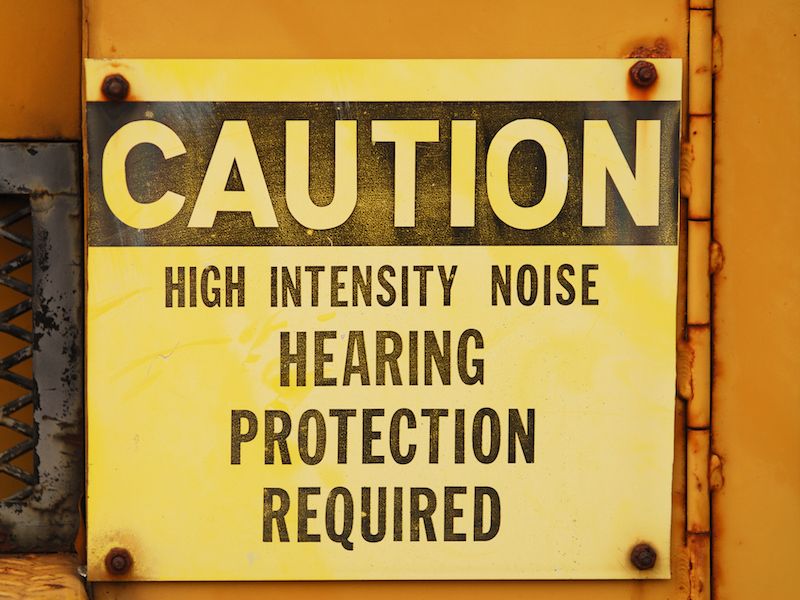
It’s one thing to recognize that you should protect your hearing. It’s a different story to know when to protect your hearing. It’s not as simple as, for example, determining when to use sunblock. (Is the sun out and are you going to be outdoors? Then you need sunblock.) It isn’t even as easy as determining when to use eye protection (Doing some hammering? Cutting some wood or working with dangerous chemicals? Use eye protection).
It can feel like there’s a large grey area when dealing with when to wear ear protection, and that can be risky. Unless we have specific knowledge that some place or activity is dangerous we tend to take the easy road which is to avoid the problem altogether.
A Tale of Risk Analysis
In general, we’re not very good at assessing risk, especially when it comes to something as intangible as damage to the ears or the risk of permanent sensorineural hearing loss. To prove the point, here are some examples:
- Person A goes to a very loud rock concert. The concert lasts about 3 hours.
- Person B has a landscaping company. After mowing lawns all day, she goes home and quietly reads a book.
- Person C works in an office.
You might believe the hearing danger is higher for person A (let’s just call her Ann). Ann leaves the concert with her ears ringing, and she’ll spend most of the next day, trying to hear herself speak. Presuming Ann’s activity was hazardous to her hearing would be fair.
Person B (let’s call her Betty), on the other hand, is exposed to less noise. There’s no ringing in her ears. So her ears must be safer, right? Not necessarily. Because Betty is mowing all day. In reality, the damage accumulates a little at a time despite the fact that they don’t ring out. If experienced on a regular basis, even moderately loud noise can have a detrimental affect on your hearing.
What’s happening with person C (let’s call her Chris) is even harder to make sense of. The majority of people recognize that you should safeguard your ears while using machines such as a lawnmower. But although Chris has a fairly quiet job, her long morning commute on the train each day is fairly loud. Also, although she works behind her desk all day, she listens to her music through earbuds. Does she need to consider protection?
When is it Time to be Concerned About Safeguarding Your Ears?
The standard rule of thumb is that if you need to raise your voice in order to be heard, your environment is noisy enough to do harm to your hearing. And you really should think about using earplugs or earmuffs if your surroundings are that loud.
If you want to think about this a little more scientifically, you need to use 85dB as your cutoff. Noises above 85dB have the potential, over time, to result in damage, so you should think about using hearing protection in those scenarios.
Many hearing specialists recommend making use of a specialized app to keep track of decibel levels so you will be cognizant of when the 85dB has been reached. You will be capable of taking the correct steps to protect your hearing because these apps will tell you when the sound is approaching a harmful volume.
A Few Examples
Your phone might not be with you anywhere you go even if you do get the app. So we might develop a good standard with a couple of examples of when to safeguard our hearing. Here we go:
- Driving & Commuting: Do you drive for Lyft or Uber? Or perhaps you’re taking the subway after waiting for a while downtown. The constant noise of living in the city, when experienced for 6-8 hours a day, can cause damage to your ears over the long haul, especially if you’re turning up your music to hear it over the commotion.
- Exercise: Your morning cycling class is a perfect example. Or even your nighttime Pilates session? Each of these cases may call for ear protection. Those trainers who make use of sound systems and microphones (and loud music) to motivate you may be good for your heart rate, but all that loudness is bad for your ears.
- Working With Power Tools: You recognize that working all day at your factory job is going to require ear protection. But what if you’re just puttering around your garage all day? Even if it’s just a hobby, hearing specialists suggest using hearing protection if you’re working with power equipment.
- Residential Chores: Even mowing the lawn, as previously mentioned, calls for hearing protection. Chores, such as mowing, are most likely something you don’t even think about, but they can lead to hearing damage.
- Listening to music with earbuds. This one requires caution, not protection. Whether your music is playing directly into your ears, how loud it is playing, and how long you’re listening to it are all things you should pay attention to. Think about using headphones that cancel out outside noise so you don’t need to crank up the volume to damaging levels.
A good baseline may be established by these examples. If there is any doubt, though, use protection. In most cases, it’s better to over-protect your ears than to leave them exposed to possible harm down the road. Protect today, hear tomorrow.
